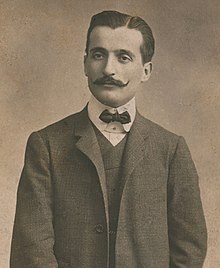Hil Mosi
Hil Mosi | |
|---|---|
 | |
| Pronunciation | Also pronounced Hilë |
| Born | 22 April 1885 |
| Died | 22 February 1933 (aged 47) Tirana, Albania |
Hil Mosi (1885-1933) was an Albanian politician and poet.
Biography
Hil Mosi, son of Mark Mosi, was born in Shkodër, northern Albania in 1885. He attended an Italian elementary school and later the Xavierian Shkodër Jesuit College before studying from 1904 to 1908 in Klagenfurt, southern Austria in order to become a teacher. In 1911, he took part in the Albanian uprising of northern Albania against Montenegro and the Ottoman Empire. In 1916 he became a member of the Albanian Literary Commission, and in 1920 a member of the Albanian delegation in the League of Nations. He was also a deputy of Shkodër from 1920 to 1924.[1]
In 1924, Mosi was one of the main supporters of the revolution that overthrew the regime of Ahmet Zogu and established a democratic government. Fan S. Noli became the new Prime Minister, while Mosi served as a prefect of Korçë and Gjirokastër. After the restoration of Zog's regime he was initially exiled but returned to Albania in 1927 after amnesty was proclaimed and served anew in the government as minister of public works. In 1928, he served as director-general of public security and from 1930 until his death as minister of education.[1]
Work
Mosi's poetry contains mainly themes of patriotism and love. Most of his works were published between 1900 and 1925. His works include:
- Këngat Shqipe (English: Albanian Songs), Thessaloniki, 1909.
- Zan' i Atdheut (English: The Voice of the Homeland), Trieste, 1913.
Sources
- ^ a b Fishta, Gjergj; Robert Elsie; Janice Mathie-Heck (2005). The highland lute: (Lahuta e malcís) : the Albanian national epic. Centre for Albanian Studies (London, England). I.B.Tauris. p. 445. ISBN 1-84511-118-4.
